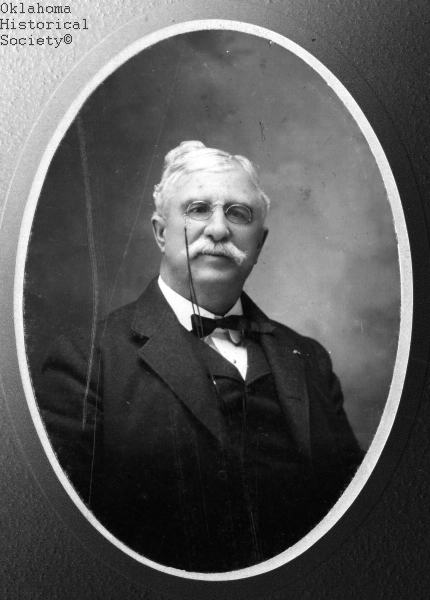
The Encyclopedia of Oklahoma History and Culture
TOWNSEND, HOSEA (1840–1909).
An attorney and a judge of the United States Court for the Indian Territory, Hosea Townsend was born on June 16, 1840, to Hiram and Eliza Townsend in Greenwich, Ohio. He was attending Western Reserve College when the Civil War began in 1861, and he began his military service as a private in the Second Ohio Cavalry. He was promoted to second lieutenant before being discharged in 1863 for health reasons. Returning to Ohio, he read law, and was admitted to the bar in 1865. In that year he married Anna Barnes.
Townsend practiced law for a number of years in Memphis, Tennessee, returned to Ohio, and then moved to Silver Cliff, Colorado, where he made and lost a fortune in the mining business. He was elected to the U.S. House of Representatives and represented Colorado in Congress for two terms, 1889 to1893. He lost his bid for a third term in 1892. Although a Silver Republican, in 1897 he was appointed to the United States Court for the Indian Territory, Southern District, by Pres. William McKinley.
Townsend had a forceful personality. In one case, a Seventh Day Adventist refused to perform jury duty on a Sunday, and Townsend found him in contempt of court. He discharged a jury that returned a verdict with which he disagreed saying it was "discharged for the term, and I never want to see any of you in my court again." Yet he extended leniency to a bootlegger whose family needed him at home to keep food on the table.
As judge of the Southern District, Townsend sentenced Rufus Binyon to death for murder; this was the only instance in the Southern District in which a defendant sentenced to death was executed. Capital cases were appealed to the Indian Territory Court of Appeals, which did not have a bench separate from the nisi prius (original trial court) bench. The trial judges sat as appellate judges in cases they had not tried. When sitting on the appellate bench, the titles for the jurists were chief justice and associate justice. The judge senior in commission served as chief justice. In a case in the appellate court, Associate Justice Townsend authored the opinion in Williams v. United States, 88 S.W. 334, 6 Ind.Terr.1 (Ind.Terr.Ct.Apps. 1905), upholding a death sentence from the Central District.
Judge Hosea Townsend was reappointed until the Indian Territory Court ceased to exist with statehood in 1907. He remained in Ardmore and practiced law until his death on March 4, 1909. He is buried in Norwalk, Ohio.






